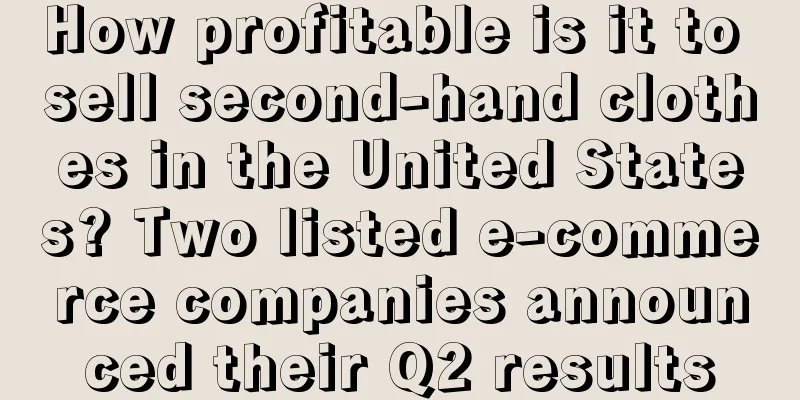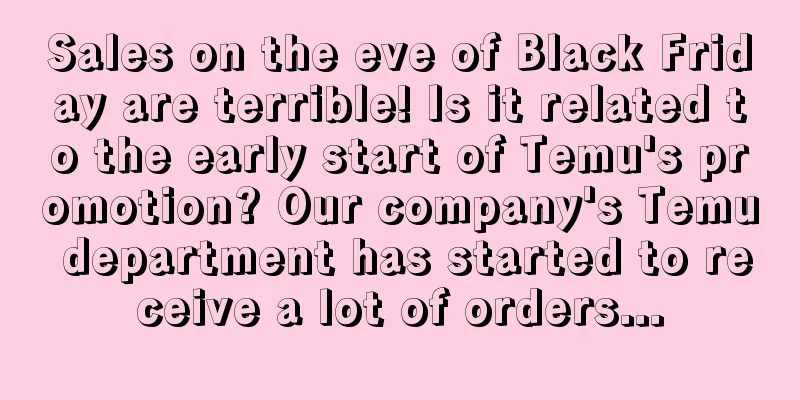How profitable is it to sell second-hand clothes in the United States? Two listed e-commerce companies announced their Q2 results

|
The demand for second-hand goods in the United States continues to rise, and the scale of the second-hand e-commerce market continues to expand. However, most brands are skeptical about the profitability of second-hand e-commerce. Recently, ThredUp and The RealReal, the two largest second-hand e-commerce platforms in the United States, released their second-quarter financial reports. As listed companies, their performance may reflect the growth potential of this market to a certain extent.
The second quarter financial reports showed that the profitability of both ThredUp and The RealReal has improved. ThredUp's net loss narrowed to $18.8 million from $28.4 million a year ago, and the net loss of The RealReal, which focuses on luxury goods, narrowed to $41.3 million from $53.2 million a year ago.
Betting on the consignment model to bring growth to second-hand e-commerce
For both platforms, the improvement in profitability is partly due to the growth brought by the shift to consignment business. There are two main sales models for second-hand e-commerce in the United States, namely resale as a service (RaaS) and consignment model. In both models, the platform is responsible for listing, operation and delivery. The difference is that in the former, merchants do not retain the ownership of the goods, while in the latter, merchants retain the ownership of the goods, and the sales fees are also different.
Second-quarter data showed that ThredUp's consignment revenue grew 10% to $53.4 million, and the company is shifting its European business and RaaS business to a consignment model. The RealReal's consignment revenue was basically flat, with only a slight decline to $96.6 million.
The advantage of the consignment model is that the profit is higher.
After Koryl officially became the CEO of The RealReal in February this year, he implemented a series of cost-cutting and efficiency-enhancing measures, including abandoning the company's own inventory and consignment goods priced below $100, focusing on higher-profit goods.
In the second quarter, The RealReal's merchandise sales fell 7% and revenue fell 15.3% to $131 million, but the number of active buyers increased 11% year-on-year to 985,000 and the average order value increased 10% to $537.
As for ThredUp, after switching to a consignment model, its gross profit increased by 6% year-on-year, and its revenue increased by 8.2% to $82.7 million. The number of active buyers was 1.7 million, and the number of orders was 1.8 million, a slight decrease of 0.8% and an increase of 5% year-on-year respectively.
In addition to commodities, what other growth ideas does second-hand e-commerce have?
In addition to selling second-hand clothing, ThredUp and The RealReal are also seeking new sources of revenue growth.
For ThredUp, its resale-as-a-service model is also a major source of revenue, accounting for 25% of revenue. In the second quarter, the company added 11 brands to its RaaS program, including American Eagle Outfitters and SoulCycle, and now has more than 50 partner brands.
ThredUp also boosts margins and revenue by charging consignment merchants a fee to ship packages, and its consignment business grew this quarter for the first time in four quarters. ThredUp is currently shifting its European business and RaaS offering to a consignment model.
The RealReal launched an advertising plan in July in the hope of increasing advertising revenue. Its CEO said that advertising space on The RealReal's website will cover more page types and will be extended to emails and other applications. By expanding the coverage of advertising space, The RealReal hopes to attract more traffic and further drive advertising and sales revenue growth.
In addition, WD Partners' research last year found that many American consumers are keen to pick up second-hand goods at various large retailers or shopping malls, and The RealReal and ThredUp have also made some offline layouts. However, so far, brands still mainly sell second-hand goods through online cooperation.
Second-hand consumers often hope to buy higher quality branded goods at a lower price rather than simply a low price, so second-hand e-commerce sales are more suitable for mid- to high-end branded goods.
However, some brands that focus on environmental protection are also suitable for developing second-hand business. For example, REI, an outdoor equipment brand that focuses on environmental protection, has seen its second-hand sales continue to grow because its brand image is well matched with second-hand sales, which has further increased its brand awareness.
Editor✎ Ashley/ Disclaimer: This article is copyrighted and may not be reproduced without permission. |
Recommend
Do you know Dealnews?
text At present, the most popular off-site promoti...
What is Payoneer? Payoneer Review
Payoneer (P card) is an institution authorized by ...
Free of charge! Just now, FBA has a big update...
At the end of the year, FBA has ushered in a wave...
What is Creator 3D? Creator 3D Review
Shenzhen Chuangxiang 3D Technology Co., Ltd. is an...
Amid the "price reduction and clearance" craze, the more expensive clothing is, the better it sells in the American clothing market?
In the midst of the "price reduction and cle...
Shopify Q3 revenue exceeded expectations! GMV increased 11% year-on-year to US$46.2 billion
<span data-docs-delta="[[20,"获悉,10月27日,加拿大...
From a loss of 2.7 billion to a loss of nearly 300 million, Youkeshu gradually emerged from the shadow of account suspension
In early January, foreign media reported that Amaz...
Chat GPT may replace Amazon operations?
Recently, one of the generative artificial intell...
Super interesting丨Thousands of people gathered, many big names gathered, the 2021 Shenzhen-Dongguan-Huizhou Cross-border E-commerce Product Selection Conference is ready to go
In 2021 , let us continue to focus on the Shenzhe...
What is the United States Court of Appeals for the Federal Circuit? Review of the United States Court of Appeals for the Federal Circuit
The United States Court of Appeals for the Federal...
What is Socialbakers? Socialbakers Review
Socialbakers is a leading social media analytics c...
Amazon’s new feature: new product recommendations
1. Log in to Amazon backend, click "Growth&qu...
What is Overgrowth? Overgrowth Review
Overgrowth is a brand and social proof tool design...









